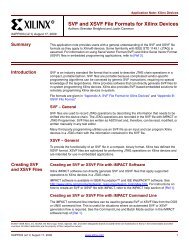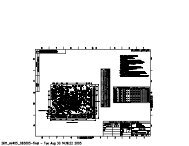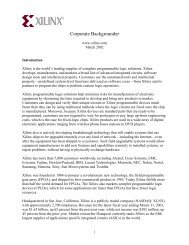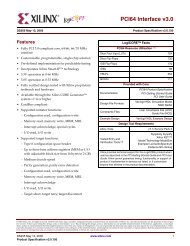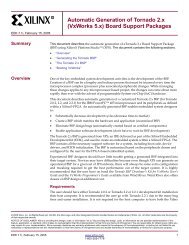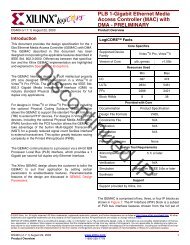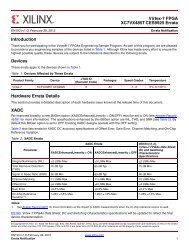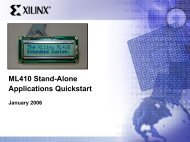Xilinx DS099-E04 XC3S400 FPGA Errata and Deviations from ...
Xilinx DS099-E04 XC3S400 FPGA Errata and Deviations from ...
Xilinx DS099-E04 XC3S400 FPGA Errata and Deviations from ...
You also want an ePaper? Increase the reach of your titles
YUMPU automatically turns print PDFs into web optimized ePapers that Google loves.
Spartan-3 <strong>XC3S400</strong> <strong>FPGA</strong> <strong>Errata</strong> <strong>and</strong> <strong>Deviations</strong> <strong>from</strong> Spartan-3 Data Sheet<br />
OPTION 3: In a system that requires that the VCCINT supply is last in the power-up sequence,<br />
ensure that it ramps to its maximum POR threshold voltage (VCCINTT = 1.0V) in less than < 500<br />
µS, as shown in Figure 4.<br />
VCCINT Supply<br />
OK<br />
Faster ramp rates<br />
ensure successful<br />
configuration<br />
< 500 µS<br />
VCCINTT = 1.0V<br />
Slower ramp rates<br />
potentially fail<br />
Figure 4: Use Faster VCCINT Ramp Rate if VCCINT is Last Supply<br />
JTAG INTEST Instruction during UPDATE_DR Operation Potentially Forces Dedicated<br />
Configuration Input Pins to Invalid Value<br />
Applications Affected by This Issue<br />
This issue only affects applications that use the JTAG INTEST feature. If used at all, this feature<br />
is typically part of a JTAG-based device test procedure.<br />
This issue does not affect applications that use the JTAG interface to download configuration<br />
data.<br />
This issue only affects the <strong>XC3S400</strong> <strong>FPGA</strong>s shown in Table 6, marked with the “BFQ”<br />
mask/fabrication/process code as shown in Figure 1.<br />
Table 6: Spartan-3 <strong>XC3S400</strong> <strong>FPGA</strong>s Affected by the JTAG INTEST Instruction Issue<br />
Device Types: <strong>XC3S400</strong><br />
Mask Revision Codes: B only<br />
Fabrication/Process Codes: FQ only<br />
Packages: All<br />
Speed Grades: All<br />
Date Codes: All<br />
Description of Issue<br />
The dedicated configuration input pins may be inadvertently forced High or Low during a JTAG<br />
INTEST operation.<br />
After the device is configured, the M2, M1, M0, <strong>and</strong> HSWAP_EN pins may be driven High or Low<br />
without consequence. The INTEST operation does not affect these pins unless the <strong>FPGA</strong> is unconfigured.<br />
However, if the INTEST operation drives HSWAP_EN Low during an UPDATE_DR operation,<br />
then the <strong>FPGA</strong> restarts its configuration process. Because PROG_B follows HSWAP_EN in the<br />
JTAG chain, the Low in HSWAP_EN shifts into PROG_B, inadvertently triggering a device<br />
reconfiguration.<br />
Correction/Workaround/Resolution<br />
Do not shift a '0' into the HSWAP_EN position during device test using JTAG INTEST. If the<br />
JTAG operation consistently drives HSWAP_EN High, then the PROG_B pin is never driven Low<br />
during the operation. However, the other dedicated configuration inputs may still see invalid<br />
values.<br />
This issue is corrected on <strong>XC3S400</strong> <strong>FPGA</strong>s with a “BGQ” fabrication/process code marking, as<br />
shown in Figure 2.<br />
<strong>DS099</strong>-<strong>E04</strong> (v2.5) December 14, 2006 www.xilinx.com 5







